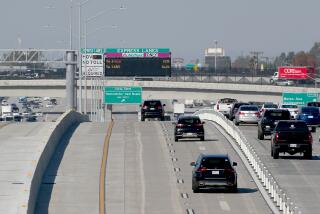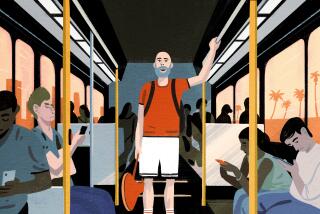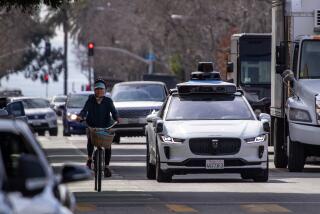Commercial carpooling (although it’s illegal) is growing in L.A., Uber and Lyft say
A bill legalizing commercial carpooling stalled in the California Legislature last summer, but that hasn’t stopped Californians from embracing the transportation option now offered by companies such as Uber and Lyft.
Friday marked a year since Uber launched its carpooling service, UberPool, in Los Angeles. The San Francisco company said that in that span, UberPool accounted for 25% of all Uber trips taken in L.A.
While the company did not reveal specific ride numbers, it said “millions” of trips were completed during that time.
See the most-read stories this hour >>
Uber’s competitor, Lyft, offers a similar carpooling service called Lyft Line, which launched in L.A. nearly a year and a half ago. Lyft declined to disclose its ride numbers in Los Angeles, but said that over the past, year Lyft Line usage has grown more than fourfold.
In San Francisco, UberPool and Lyft Line account for 50% of rides taken with the companies.
“This is a product reducing congestion, because instead of two cars, individuals can now share one,” said Christopher Ballard, general manager of Uber’s Southern California operations. “The trends are continuing. Angelenos are continuing to choose UberPool.”
Ballard said there were other factors driving the growing popularity of carpooling, including cost (carpool rides are often cheaper than nonshared rides because fares are split among multiple passengers), environmental concerns and the social aspect of sharing a ride with others.
Commercial carpooling is technically illegal in California because of a 1961 law that forbids charging passengers in a commercial ride separately for sharing that ride.
The Public Utilities Commission, which regulates transportation network companies such as Uber and Lyft, chose not to enforce that law when Uber and Lyft launched their carpooling services, but recognized that the Legislature had to update state law.
Assemblyman Phil Ting (D-San Francisco) introduced a bill last April that would legalize such services. The bill passed the Assembly in May by a 69-0 vote and is currently waiting to be heard by the Senate Committee on Energy, Utilities and Communications.
Twitter: @traceylien
See more of our top stories on Facebook >>
ALSO
SeaWorld Entertainment shakes up its management team
Alfred Mann, the billionaire founder of drugmaker MannKind, steps down
Apple admits it can write software to unlock terrorist’s iPhone, prosecutors say







